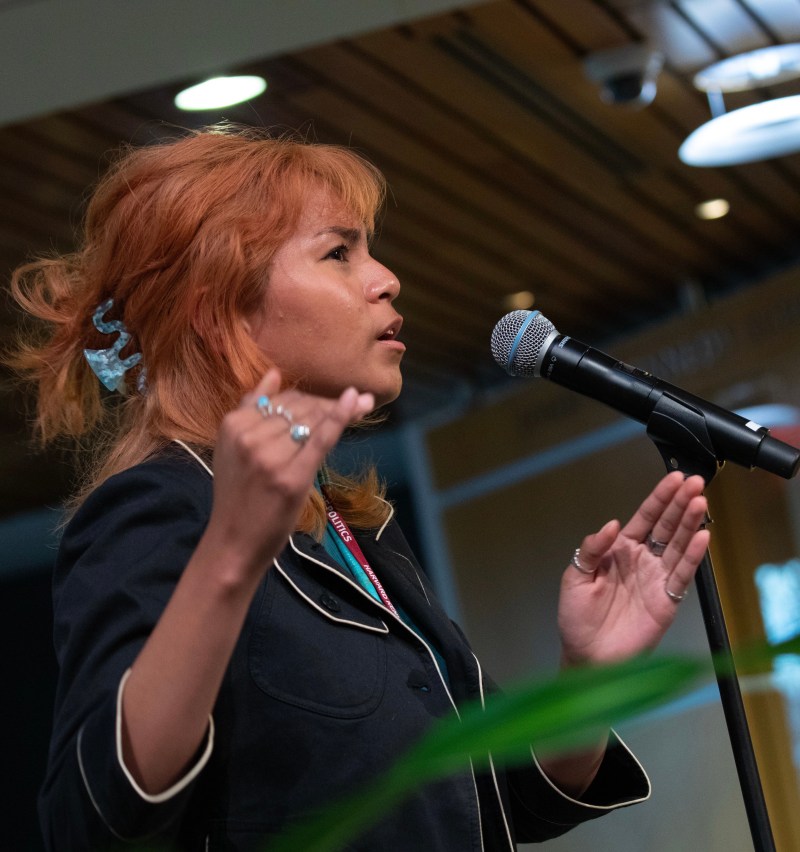Lily Joy Winder ’25 never wants another child to experience the racism she faced while growing up in Albuquerque, New Mexico. So, when her TikTok videos began to explode in popularity, she saw an opportunity: With the new audience she’d amassed, Winder turned her content toward Native American issues, advocating for the world she wished she’d had.
In a predominately white and upper middle class high school, Winder said she experienced blatant prejudice from her classmates.
“I was called so many disgusting slurs,” she said. “Once in class, my classmates were pointing at slave propaganda and saying, ‘Look, that’s you.’”
Winder rarely learned about Native American history in school either. “I didn’t even know about the Missing and Murdered Indigenous Women epidemic,” she said, referencing the disproportionate rate at which Indigenous women go missing and are murdered in the U.S. “I had to seek that out myself.”
At the end of her sophomore year, Winder realized that her younger sibling would soon enter high school too. Feeling driven to make her school a safer place, she founded the Native American Student Union to foster respect between Native and non-Native students. But that was only the beginning of her advocacy.
Winder began posting on TikTok in the summer of 2019. Within months, her humorous high-school related videos began to go viral, and she decided to shift the focus of her content to something that she knew she cared deeply about. Since then, Winder’s TikTok has provided an Indigenous perspective on current events such as environmentalism and sexual violence, which disproportionately impacts the Native American community. Most recently, for instance, Winder spoke on the injustice of the Oklahoma v. Castro-Huerto Supreme Court case, which held that states have jurisdiction to prosecute crimes committed by non-Indians against Indians in Indian country.
But despite her virality, the social media app has not been an ideal platform for Winder either. Because of its format of short, 15-second to three-minute long videos, Winder said she is forced to condense “complex, nuanced ideas about systemic issues in compact, 15-second videos” to capture viewers’ attention.
Tiktok also operates on trend cycles, meaning Winder’s work only widely circulates on TikTok during Indigenous People’s month or when Indigenous-relevent issues are trending, she said.
“People of color should not have to make their issues entertaining for people to actually care,” Winder said, but she will “make the best of it.”
Winder also feels that her work has also been repeatedly overlooked because of the negative stereotypes associated with TikTokers. While working with Gen-Z for Change, Winder said she was called a “little kid” and her work was deemed unimportant.
“People underestimate TikTok as a dancing app,” Winder said. “But TikTok and other social media is a great way for marginalized people, who typically don’t have a platform, to express what they’re passionate about.”
Through TikTok, Winder also became connected to Sofia Ongele, another young activist with whom she collaborated on her campaign “People Not Mascots.”
“People Not Mascots” aims to remove Native mascots from American high schools. Despite a 2005 American Psychological Association study establishing that they detrimentally impacted Native children, 1 in 19 secondary schools in the U.S. still has a Native mascot today.
Since Winder took to TikTok for the campaign, the #PeopleNotMascots hashtag has received 2.9 million views and around 40,000 people have interacted with its website. Several high schools around the country have agreed to change their mascots following signed petitions — “a huge win,” in Winder’s eyes.
“But of course, there will always be a school superintendent that refuses to change regardless of the thousands of signatures a petition receives,” she said, adding that she is also looking toward advocating federal legislation to proscribe the use of Native mascots.
TikTok has also opened doors for Winder to more traditional, institutionalized platforms. She was recently invited to speak at the Harvard University Institute of Politics, a “super empowering” opportunity she attributes to her fame on the app.
“When you deliver results, which Lily has, more established organizers have no choice but to take you seriously,” Aidan Kohn-Murphy, Winder’s friend and Gen-Z For Change Founder, said. “I know that People Not Mascots has and will continue to do incredible things and that Lily will never cease to inspire all of those around her.”
At Stanford, Winder is double majoring in ethnic studies and film. She said she chose Stanford because of its Native American community and relative commitment to its Native students in comparison to other top universities.
“I take a lot of Native history classes,” Winder said. “The Comparative Studies in Race and Ethnicity major is amazing and I found a lot of my community within those classes.”
Outside of academics, Winder works with Justice for Muwekma, an organization fighting for the Muwekma Ohlone Tribe’s federal recognition for whom she tabled at the 51st Stanford Powwow.
Now, Winder is also looking toward new horizons, including passing federal legislation. “Lily inspires me everyday,” Victoria Hammett, Deputy Executive Director of Gen-Z for Change said. “She has accomplished so much already and I know for a fact that she’s just getting started.”
For Winder, though, her work has been centuries in the making, having its roots in “long, long histories of very strong people who endured horrendous things so that we can carry the torch, that we are not alone in our struggles.”
“By simply existing and getting up in the morning, I’m defying societal standards, colonialism, and systemic oppression,” she said. “The most resistive thing you can do is be joyful.”
